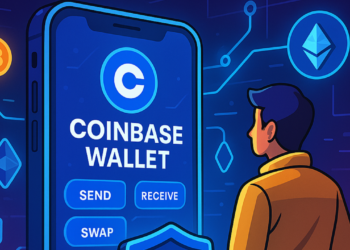As the world of decentralized finance (DeFi), NFTs, and Web3 continues to grow, crypto users are moving away from centralized exchanges toward self-custody wallets. Coinbase Wallet — not to be confused with the Coinbase exchange — is one of the most popular non-custodial wallets available today.
But here’s the thing: Coinbase Wallet comes in two forms — a mobile app and a browser extension. So which one is right for you?
In this comprehensive guide, we’ll explore:
- The key differences between Coinbase Wallet mobile and browser extension
- Pros and cons of each
- Which one is better for DeFi, NFTs, or everyday crypto users
- How to send crypto from Coinbase Wallet (mobile and desktop)
- Security tips, including hardware wallets like Trezor Model T and Ledger
- Using Coinbase Wallet in combination with exchanges like Bybit and MEXC
Let’s dive in.
What Is Coinbase Wallet?
Coinbase Wallet is a non-custodial crypto wallet created by Coinbase, but it operates separately from the centralized Coinbase exchange.
Key features:
- You control your private keys
- Store ERC20, BEP20, and other tokens
- Access Web3 apps (DeFi, NFTs, DAOs)
- Securely manage multiple blockchains
- Sync with dApps using WalletConnect or direct integration
You can download Coinbase Wallet as:
- A mobile app (iOS & Android)
- A browser extension (Chrome, Brave)
Coinbase Wallet Mobile App: Overview
The mobile version of Coinbase Wallet is a powerful, all-in-one tool for Web3 users on the go.
✅ Pros
- Easy-to-use interface
- Native NFT support (Ethereum, Polygon)
- Built-in DApp browser
- Biometric login (Face ID / Fingerprint)
- QR code scanner for WalletConnect
- Push notifications for activity
❌ Cons
- Smaller screen = less ideal for complex DeFi tasks
- Some dApps may not be optimized for mobile
- Slightly harder to copy/paste wallet addresses
Coinbase Wallet Browser Extension: Overview
The browser extension works much like MetaMask and is designed for desktop Web3 interaction.
✅ Pros
- Great for using DeFi apps on your computer
- Easier to multitask between tabs
- Faster typing, better transaction control
- Ideal for minting NFTs, trading on DEXes, or using DAOs
❌ Cons
- No biometric security
- No camera (can’t scan QR codes)
- Requires browser security awareness (avoid phishing)
Coinbase Wallet Mobile vs Browser Extension – Feature Comparison
| Feature | Mobile App | Browser Extension |
|---|---|---|
| Biometric security | ✅ Yes | ❌ No |
| NFT support | ✅ Yes (native) | ✅ Yes (via dApps) |
| DApp browser | ✅ Yes (built-in) | ❌ No (use desktop browser) |
| WalletConnect | ✅ Yes (QR + deep link) | ✅ Yes (desktop link) |
| Best for | Casual users, NFT collectors | DeFi power users, DAOs |
| Security | Local + biometric | Depends on browser hygiene |
| Multitasking | ❌ Limited | ✅ Easy |
🛠️ How to Send Crypto from Coinbase Wallet (Mobile & Browser)
Sending tokens from Coinbase Wallet is simple, but you’ll need some native gas token in your wallet (e.g., ETH, BNB, MATIC) to complete the transaction.
📲 On Mobile
Step-by-step:
- Open the Coinbase Wallet mobile app.
- Tap the “Send” button.
- Choose the token you want to send.
- Enter the recipient address or scan a QR code.
- Set the amount to send.
- Tap Next.
- Confirm the gas fee and tap Send.
💡 Pro tip: Double-check the network! Sending a BEP20 token to an ERC20 wallet can result in permanent loss.
🧩 On Browser Extension
Step-by-step:
- Open your browser and click the Coinbase Wallet icon.
- Unlock your wallet with your password.
- Select the token you want to send.
- Click Send.
- Paste the recipient address.
- Enter the amount.
- Adjust gas fees if needed.
- Click Send and confirm.
You can also connect Coinbase Wallet to Web3 apps (like Uniswap, Aave, or OpenSea) and send directly from dApps.
🌐 Coinbase Wallet and Web3 Compatibility
Both the mobile and desktop versions allow access to:
- Uniswap, SushiSwap, PancakeSwap
- Aave, Compound, Yearn
- OpenSea, Rarible, Zora
- Snapshot (DAOs), ENS, and more
Mobile connects via:
- Built-in DApp browser
- WalletConnect
Browser connects via:
- Direct Web3 injection (dApp → Connect Wallet)
🖼️ NFTs in Coinbase Wallet
Coinbase Wallet supports:
- Ethereum NFTs (ERC721 & ERC1155)
- Polygon NFTs
- Basic support for BNB Chain NFTs
View NFTs:
- Mobile app: NFT tab
- Browser: view via connected dApp (e.g., OpenSea)
Coinbase Wallet doesn’t offer NFT marketplace browsing, but you can access marketplaces directly via WalletConnect or DApps.
🔒 Security Tips: Protecting Your Coinbase Wallet
Security is your responsibility with non-custodial wallets. Here’s how to stay safe:
🔐 1. Back Up Your 12-Word Recovery Phrase
- Store it offline, never on cloud or notes apps
- Consider a metal backup like Cryptosteel
🔐 2. Use a Hardware Wallet
Coinbase Wallet doesn’t support hardware wallets directly, but you can:
- Use Ledger or Trezor with MetaMask
- Send funds from Coinbase Wallet to your hardware wallet for cold storage
Recommended Devices:
🔐 3. Enable App Lock and Biometrics (Mobile)
Go to Settings > Security:
- Enable PIN / Face ID / Touch ID
- Turn on Auto-Lock
🔐 4. Watch Out for Phishing
Always verify URLs when connecting to Web3 dApps. Bookmark trusted sites like:
Never connect your wallet to unknown “airdrop” or “claim” websites.
🔁 Sending Crypto from Coinbase Wallet to an Exchange
Need to sell or convert your crypto?
Here’s how to transfer from Coinbase Wallet to a centralized exchange like Bybit or MEXC:
🔹 Bybit
- Open Bybit and go to Assets > Deposit
- Select the crypto and network
- Copy the deposit address
- Go to Coinbase Wallet and Send
- Paste address, choose amount, send
🔹 MEXC
- Open MEXC and tap Deposit
- Choose token and matching network (ERC20 or BEP20)
- Copy address
- Send from Coinbase Wallet
⚠️ Always double-check network compatibility to avoid irreversible loss.
📊 Which Coinbase Wallet Version Should You Use?
Use the Mobile App if:
- You want biometric security
- You’re mostly using NFTs
- You like quick DeFi access on the go
Use the Browser Extension if:
- You work on desktop
- You need fast DeFi tools
- You want easy multitasking
Many users install both versions and sync the same wallet across devices — just remember: every synced device has full control.
🔁 How to Switch Between Devices
You can import the same Coinbase Wallet on multiple devices by:
- Writing down your 12-word recovery phrase
- Installing the app or extension
- Choosing “Import existing wallet”
- Entering the phrase
Be cautious: multiple-device access increases the attack surface.
✅ Final Thoughts
Coinbase Wallet offers an excellent user experience whether you’re on mobile or desktop. Both the mobile app and browser extension come with their own strengths — and choosing the right one depends on how and where you interact with Web3.
The mobile app is best for:
- NFT collectors
- Casual users
- Mobile-first DeFi explorers
The browser extension is best for:
- Power users
- DAO voters
- Desktop DeFi users
No matter your preference, remember to:
- Back up your seed phrase
- Keep your wallet secure
- Consider moving large assets to a Trezor or Ledger
- Use reliable exchanges like Bybit or MEXC for buying and sending crypto
With the right setup, Coinbase Wallet is one of the most flexible and secure self-custody wallets for 2025.
⚠️ Disclaimer
This article is for educational purposes only and does not constitute financial or investment advice. Always do your own research (DYOR) before making any financial decisions. This article contains affiliate links. If you use them, we may earn a commission at no extra cost to you, which helps support the creation of free educational content.










